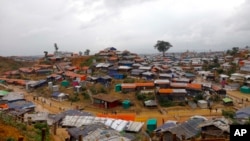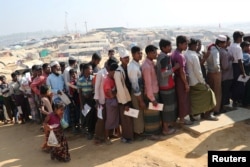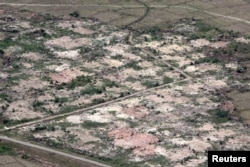The most recent commission formed by the Myanmar government to try and bring a solution to the issues in Rakhine State has come under criticism from international and domestic actors, highlighting the complexity of dealing with challenges in the beleaguered state.
Last month, the President’s Office announced the formation of a new “independent commission of inquiry” which is tasked with investigating allegations of human rights violations “and related” issues in Rakhine.
The four-member commission is comprised of two international members, Rosario Manalo, former deputy foreign minister of the Philippines, and Kenzo Oshima, Japan’s former ambassador to the United Nations. The two Myanmar members of the commission are lawyer Mya Thein and economist Aung Tun Htet.
Aung Tun Htet has already been involved in previous commissions on Rakhine – which have largely denied any wrongdoing on behalf of Myanmar authorities – and he has previously dismissed accusations that ethnic cleansing has taken place in the state, home to the country’s Rohingya Muslim minority.
Myanmar has come under considerable criticism for its handling of the crisis, which was triggered by attacks from the Arakan Rohingya Salvation Army, leading to a brutal army crackdown that saw 700,000 mainly Rohingya flee over the border into Bangladesh.
Myanmar has already formed numerous commissions regarding the crisis, but these have been criticized for lacking independence from the military, which is accused of some of the gravest abuses, a charge it denies.
A government spokesperson couldn’t be reached for comment about the new commission.
In December 2017, then-president Htin Kyaw established a ten-member Advisory Commission Board on Rakhine State to advise the government on implementing the recommendations of another commission, the Advisory Commission on Rakhine State, which was headed by former U.N. secretary general Kofi Annan and submitted its findings to the government last August.
Two international members of the December-formed commission have already resigned, saying it lacks independence.
Credibility questions
Laetitia van den Assum, who was a member of the Annan-led commission, said that questions remain regarding the independence and mandate of the new body.
She said it appeared to have been established as an alternative to earlier investigations by Myanmar to investigate alleged crimes in Rakhine State.
“Those earlier investigations lacked credibility,” she told VOA.
Van den Assum said that for a commission to be credible it must have a clearly defined legal mandate to investigate allegations of crimes, demonstrable independence from all authorities, and sufficient resources and adequate support capacity.
She acknowledged that some members of the international community, including the U.N. Security Council, had pushed for an international committee to be established.
“But if minimum standards for a credible inquiry are not met, the situation and thus the impunity are at risk of deepening further,” she said.
Myanmar analyst Yan Myo Thein said some people in Myanmar, in particular the military, were critical of the commission because of what they regard as foreign intervention in Myanmar’s internal affairs.
However, he acknowledged that some people in Myanmar would view the commission positively, because they recognized the need for help from members of the international community to deal with the crisis.
Key to whether or not the commission would be a success was whether or not the military would cooperate, he said.
“They may cooperate, but their primary concern will be for there to be no foreign participation in resolving the domestic and internal affairs of Myanmar,” he told VOA.
Slow implementation
Earlier this week, a statement from the United Nations urged Myanmar to step up implementation of an agreement it signed in June regarding the repatriation of refugees from Bangladesh.
The statement from the U.N.’s Refugee Agency and the U.N. Development Program said they were still waiting for the government to approve travel authorization requests for international staff members in northern Rakhine.
“The Myanmar government’s willingness to take the lead in the implementation of this agreement is critical to creating conditions conducive for the voluntary, safe, dignified and sustainable return of Rohingya refugees,” the statement said.
The statement said some encouraging steps had been made since the agreement was signed in June, including the formation of a tripartite Technical Working Group, but said “substantial progress” is urgently needed in three areas: granting effective access in Rakhine, ensuring freedom of movement for all communities, and addressing the root causes of the crisis.
It also urged the government to implement the recommendations of the Annan commission, including “a clear, voluntary and equal pathway to citizenship for all eligible individuals”.
Myanmar insists it is ready to begin the repatriation process, but Rohingya living in Bangladesh have said they will not return without guarantees.
“If we come back, we must be guaranteed our citizenship and our safety,” said Nay Lin Aung, a Rohingya man who fled Myanmar last year and is now living in an area known as “No Man’s Land” between the two countries. “Our houses were burned, and we lost everything. That’s why we haven’t come back.”






